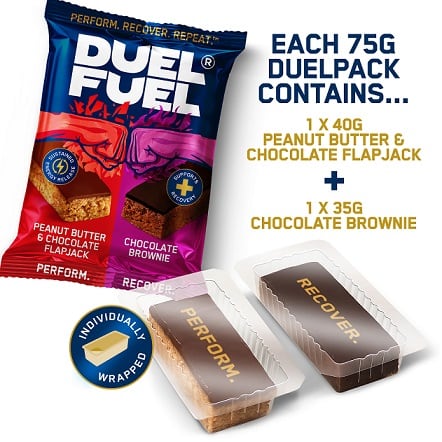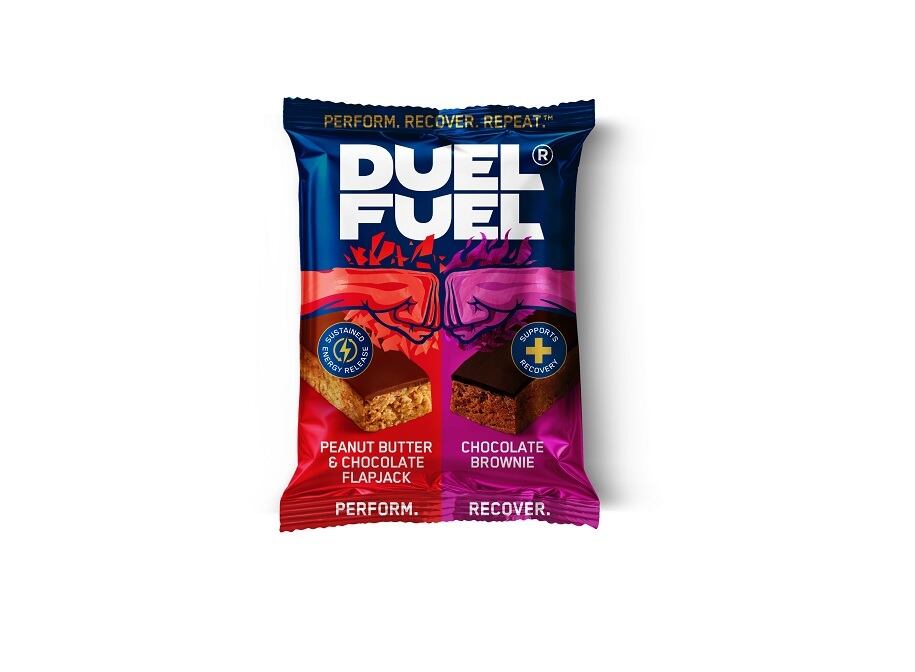Launched in April 2022, DuelFuel was a high protein and fiber flapjack and brownie bar that contained 26 added vitamins and minerals and used protein and collagen powders as a replacement for standard flour.
On the day the product launched in the UK, its founder Tim Davies received a letter from the UK’s tax authority stating the product would be categorized as confectionery rather than cake (which are VAT free as a staple food) and would therefore be subjected to 20% VAT.
HMRC argued the flapjack element could not be categorized as such when sold in a gym and argued the cake element’s ingredients were not the usual cake ingredients and were designed to be eaten as a post-workout snack so could not be considered cake.
Unable to absorb the VAT cost or viably pump up the price of his products to cover the cost, Davies had to close down the business in the summer of 2022 and battled the decision through tribunal.
His first tribunal decision came early last year with the court deeming: “Though the ordinary person on the street might think a tray bake of flapjacks at the school cake sale is a cake, that doesn’t necessarily mean that they would think the same about these products being sold in the gym.”
It ultimately concluded because the product was “a sweet prepared food normally eaten with the fingers,” it met the definition of, and should be treated as, confectionery.
Davies spent the last 18 months trying to take this decision to the supreme court, but after a number of hurdles, the application for permission to appeal was ultimately rejected earlier this year.
Refusing to let the HMRC’s decision seal the brand’s fate, Davies has reinvented and re-launched his product.
The new design separates the two parts of the bar and packages them in a twin bake tray, with two compartments which can be pulled apart and individually opened, allowing consumers to carry and consume one before, and one after, the gym.

With an RRP of £3.30, the pack provides a 40 gram ‘performance’ peanut butter and chocolate flapjack and a 35 gram ‘recovery’ chocolate brownie, with a total protein content of 20 grams.
“The ingredients and nutritional profile haven’t changed, only the manufacturing and packaging,” Davies told NutraIngredients. “The flapjack provides carbs and energy to fuel your gym session, while the brownie provides 16g of protein, in a sealed and compact snack that’s easy to throw in the gym bag.”
The product’s original design required each element of the bar to be flow wrapped individually, and the two to then be flow wrapped together, creating much higher manufacturing and handling costs.
“This brings the cost right down and keeps the product within an acceptable price range for consumers,” he said.
But, keeping to the original product’s ethos, the bars are still handmade and baked.
“The margins are still very tight, so only time will tell if we can survive, but the consumer can decide if we are viable, not the HMRC,” Davies added.
The product is available on Amazon only for now, with the plan to move to TikTok shop and beyond if necessary sales can be achieved.
Implications for the functional food industry
Davies told NI he plans to reveal the full details of the VAT saga in a series of YouTube videos over the coming weeks.
“It’s important that I give all the information in full,” he said. “The system is broken, and I feel a moral obligation to put this story out there. This must be happening to other food companies, causing businesses to close and jobs to be lost, and it’s a tragedy.”
He praised four specialists in VAT litigation—Daniel Rice, Max Schofield, James Hurst and Alex Spencer—for fighting the DuelFuel case on a pro bono basis.
“Without them, I wouldn’t have been able to battle the decision,” he said.
HMRC sets policy and tax tribunals make rulings in consideration of precedents set by prior decisions. Thus, the tribunal’s ruling on DuelFuel’s cakes has the potential to impact the functional foods, supplements and wellness food industries, Davies warned.
“Any food product eaten on route to the gym could be deemed to be appealing to sports enthusiasts, and not mainstream consumers—and therefore taxed accordingly,” he said. “Although ‘sports nutrition’ is not a statutory term in the VAT Act 1994, HMRC apply tax to foods that appeal to active adults for their nutritional benefit."
He suggested a more sensible, and health-promoting, strategy for taxing products would be based on nutritional value of the products.





